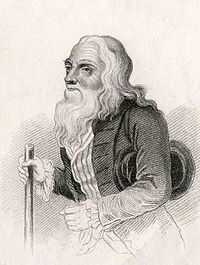Matthew Robinson, 2nd Baron Rokeby

Matthew Robinson, 2nd Baron Rokeby (1712 – 30 November 1800) was an English landowner, politician and nobleman. In later life he was considered an eccentric.
Early life
Lord Rokeby was born Matthew Robinson in a large family from Yorkshire. His parents were Matthew Robinson (1694–1778) of Edgely and West Layton, Yorkshire, and Elizabeth, daughter of Robert Drake of Cambridge; his sisters included the novelists Elizabeth Montagu and Sarah Scott. Of his six brothers, Thomas the second was known as a legal writer, William the fifth as a cleric, and the youngest, Charles, as a Member of Parliament. His father inherited property in the neighbourhood of Rokeby from his great-uncle Matthew Robinson, rector of Burneston; and his mother inherited estates at Monks Horton, near Hythe, Kent, from her brother Morris Drake Morris from [1][2]
Robinson was admitted to Lincoln's Inn in 1730, and to Trinity Hall, Cambridge in 1731. He became a Fellow there in 1734.[3] In 1746 he became a Fellow of the Royal Society, and in the same year his mother died: he was heir to her Monks Horton property.[4] As a consequence, he then assumed the additional name of Morris.[3]
Robinson-Morris represented Canterbury in Parliament, from 1747 to 1761;[3] in politics he was a Whig.[5] He inherited the title Lord Rokeby in 1794 after the death of his cousin, Richard Robinson, Bishop of Armagh.
Supposed eccentric
Lord Rokeby became an enthusiastic supporter of baths during a holiday in the spa town of Aix-la-Chapelle. When he returned to Kent, he began to make daily trips to the seashore to swim in salt water regardless of the weather. He preferred this environment to such an extent that his servant had to persuade him to come home. Sometimes he fainted and had to be rescued. He had a hut built for him on the sands at Hythe and drinking fountains along his route to the beach. He walked all the way and let his servant follow him in the carriage with full livery. If he found people drinking from a fountain, he gave them a half-crown coin.
He also let his beard grow, which was against the contemporary fashion. Eventually it was so thick that it stuck out under his arms and could be seen from behind. In a couple of years he decided to build a swimming pool in his mansion - it was built under glass and was heated by sun. There he spent hours at the time, preferably alone. He refused to have a fire in his house even in the coldest weather.
His increased isolation bred rumours, including one that he was a cannibal or ate only raw meat - when he ate mainly beef tea and nibbled at venison. He also refused to see any doctors. As for church service, he claimed that God was best worshipped at natural altars of the earth, the sea and the sky - not to mention that the sermons were boring.
When Lord Rokeby did indeed agree to accept visitors, he might "entertain" them with lengthy, boring poems. He arranged a sumptuous meal for Prince William of Gloucester but ate very little himself. He very rarely visited the court and then was an embarrassment to his socialite sister, Elizabeth Montagu. When he stayed at the Chequers Inn at Lenham in 1796 so he could vote in the general election, curious locals took him for a Turk.
Death
Lord Rokeby died in December 1800, peacefully in his bed.
References
- ↑
 Lee, Sidney, ed. (1897). "Robinson-Morris, Matthew". Dictionary of National Biography 49. London: Smith, Elder & Co.
Lee, Sidney, ed. (1897). "Robinson-Morris, Matthew". Dictionary of National Biography 49. London: Smith, Elder & Co. - ↑
 Lee, Sidney, ed. (1897). "Scott, Sarah". Dictionary of National Biography 51. London: Smith, Elder & Co.
Lee, Sidney, ed. (1897). "Scott, Sarah". Dictionary of National Biography 51. London: Smith, Elder & Co. - ↑ 3.0 3.1 3.2 "Robinson, Matthew (RBN730M)". A Cambridge Alumni Database. University of Cambridge.
- ↑ Skedd, S. J. "Morris, Matthew Robinson-". Oxford Dictionary of National Biography (online ed.). Oxford University Press. doi:10.1093/ref:odnb/23892. (Subscription or UK public library membership required.)
- ↑ historyofparliamentonline.org, Robinson (afterwards Robinson Morris), Matthew (1713-1800), of Monks Horton, nr. Hythe, Kent.
- Edith Sitwell, English Eccentrics: A gallery of weird and wonderful men and women, Harmondsworth: Penguin (1983), pp. 47–55.
- Leigh Rayment's Peerage Pages
- Leigh Rayment's Historical List of MPs
Attribution
![]() This article incorporates text from a publication now in the public domain: Lee, Sidney, ed. (1897). "Robinson-Morris, Matthew". Dictionary of National Biography 49. London: Smith, Elder & Co.
This article incorporates text from a publication now in the public domain: Lee, Sidney, ed. (1897). "Robinson-Morris, Matthew". Dictionary of National Biography 49. London: Smith, Elder & Co.
| Parliament of Great Britain | ||
|---|---|---|
| Preceded by Sir Thomas Hales, 2nd Baronet Thomas Best |
Member of Parliament for Canterbury 1747–1761 With: Thomas Best Sir James Creed |
Succeeded by Thomas Best Richard Milles |
| Peerage of Ireland | ||
| Preceded by Richard Robinson |
Baron Rokeby 1794–1800 |
Succeeded by Morris Robinson |
|
.